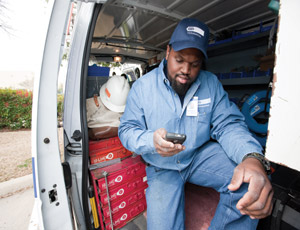Dallas-based TDIndustries recently launched TD Lifecycle Intelligent Network System (TDLINKS) to provide a mobile knowledge database for lifecycle solutions.

The real-time operating platform represents an industry first. It will provide a technology platform to enhance service solutions for routine and emergency calls, CEO Harold MacDowell tells Texas Construction.
TDIndustries’ first component of TDLINKS, ServiceLINK, launched earlier this year. It utilizes global information for each customer’s operating environment. The web-based platform enables TDI to store and track the life of a building, including its mechanical systems, automation and controls and the maintenance, operations and service histories of each customer down to the specific equipment level.
MacDowell says the platform represents a TDI niche. “Lifecycle customers, where the firm builds a project. . . those are more the norm for TDI,” he says. “We have a broader knowledge system following the DBomb theory: design, build, operate and maintain. So, we have to own that knowledge. This is the way things are moving.”
The firm’s truck-based service group has been providing routine and emergency support for more than 60 years. The new TDLINKS platform and ServiceLINK solution will enable TDI technicians to have on-site access to that historical data in real time, MacDowell says.
“Every technician can evaluate the customer’s operating environment, history, equipment, and other key records,” he adds.
ServiceLINK unites the entire TDI team in real time with wireless and mobile technologies. A technician can capture an image of a faulty connection and share information with colleagues who help troubleshoot a technical issue immediately, for example.
TDLINKS helps dispatch operations match the appropriate technicians for emergency services based on the time of day, location and history of a building and its systems.
“Our service guys and customers love it because it’s paperless,” MacDowell says. “They get information faster and we know where they are, when they got there and when they left. We’re tracking the service history by equipment, too, so an owner can know how much was invested in something and when it may be time to replace it.”
Much of the work being done today involves upgrading existing facilities more than new construction, he says.
“We’re helping owners reduce energy use through upgrades of HVAC and lighting systems, new automation and control systems to reduce energy usage,” MacDowell adds.
One of the firm’s high-profile jobs included work on the new Cowboys Stadium.
“The Cowboys job is one everyone likes to talk about, but it’s not the typical project,” MacDowell says. “Our bread and butter stuff is taking care of our ongoing clients. We have a relationship with Baylor hospital system for engineering, construction and maintenance. The airports in Houston include a lot of maintenance facility operations and system upgrades as well as energy retrofits. Repeat customers are important to us.”
One of TDI’s niches is the use of pre-fabricated materials. With the use of building information modeling, the pre-fab materials can be delivered faster to the job site.
“Pre-fab creates less clutter at the job site and improves safety,” MacDowell says. “We can lay out materials exactly where they need to be.”
div id="articleExtras"
Post a comment to this article
Report Abusive Comment